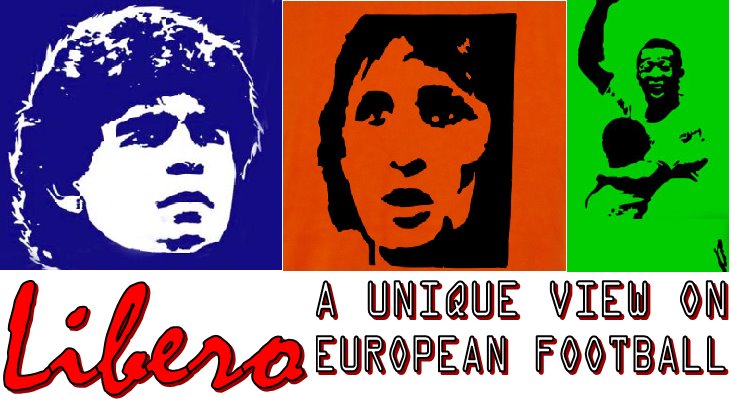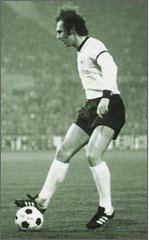In recent times, as technology increases, the relationship of the football club and the fan has evolved, become more technological and less personal. Football was always a business, a way of making money. Yet as it becomes more commercial, it shapes our way of thinking especially through the media. With the idea that Premiership clubs have become the new plaything of the typical billionaire, the globalisation of football has created a trend displaying the greatest sport in the world as a money-maker. Since 1979, Liverpool led the way in carrying shirt sponsorship, a trend which grew and still is, for the space across the front of the shirt appears now to have become prestigious. Yet recently, its morality was questioned, when Fredi Kanoute, the Sevilla striker refused to wear the logo of the team sponsor 888.com, because as a devout Muslim, he believed that the promotion of gambling poisoned the minds of young and old fans alike.
It is examples such as these which shows how the media is becoming ever important and as it through the media, of whatever kind that speculation of a plethora of matters concerning clubs occurs. The recent coverage of the Premiership is set by a deal worth £1.7 billion pounds split by BSkyB and Setanta, who broke Rupert Murdoch’s monopoly on the television rights with £625 million being split between the 20 clubs each season until the 2009/10 season, predicting a windfall of £2.7 billion for the clubs involved in that time period. The worldwide interest in the Premiership, was epitomised by the fierce bidding war by companies in Hong Kong in an attempt to win broadcasting rights. Now as media formats evolve, new rights concerning mobile phone highlights, internet, radio and naturally the prestigious terrestrial and digital television have emerged.
It is exposure of this media through which the views of a typical fan have been shaped. Those who have a lack of access to a match ticket, a common dilemma in the multicultural London, or access to a television may resort to poor quality internet streaming or an almost masochistic use through the use of Ceefax, with the constant refreshing of the page, agonising in a bid to check whether the score that concerns one has changed or not, for better or for worse.
The media communicates football all over the world and is a powerful tool, especially with ticket prices being raised with increased, watching highlights doe not give a full picture of a player’s performance, which is why attacking players with flair have greater exposure with perhaps a great piece of skill, when their overall contribution is minimal. Thus players such as Makelele or Gilberto, with their impeccable positioning and stability are not noticed on a television screen by the average fan. This view towards players whose game is based upon work ethic and generous team play is backed up by many fans, who are exposed to tabloids, where the commentary are often bias and even lazy as the Palacio hoax exposed Mark Irwin and The Sun’s ignorance. For example the overuse of comparisons of past or even present players to new signings due to a similarity in appearance or position or even nationality, and inability not to use pun in a large proportion of headlines. The lack of true journalistic integrity in ‘stealing’ stories from other newspapers or purposeful mistranslations from foreign stories are all reasons perhaps why the reading age of The Sun is between 9-10 years. It is the media that influences a typical fan’s view, with a certain Arsenal forum member convinced of Eboue’s capability to play on the right wing, dismissing Hleb’s return to form in the pre-season friendly against Trapattoni’s Red Bull Salzburg. While in the Northern parts of England, attendances continue to fall even with lowering ticket prices, a continuing trend shows that more revenue appears to be coming in from television and sponsorship deals rather than income accumulated from the total number of match-days. This commercialisation of football is epitomised by the idea of a bell being rung in the Emirates stadium before half time to inform the ‘audience’ (as they have been referred to) that they can purchase refreshments from the stalls. It is this new view towards football that is taking it away from the ‘terraces’ and making it a impersonal and corporate fashion accessory.
Yet in various parts of the world, this is not the case. The Kop may be joked at by the Arsenal fans in a recent match at Anfield with the chant ‘Stand up if you’ve got a job!’, yet is the idea that football is seen as a religion, which is why the aura of the sport still exists today. The great rivalry between the teams in the El Classico derby is described by Phil Ball through the Spanish word: morbo, literally translated as disease, yet in most cases it does not undertake this rather frank definition. An image defining this antipathy between the Catalan giants and Franco’s team is the plethora of objects thrown at Figo, a player who transferred for £37 million from Barcelona to Real, with the peak of ‘hatred’ the pig’s head; this act did not allow the winger to take a corner until deep into the match.
For example a young fan of either party are bred to detest the other, with the reason an enigma to the mind of the child, not exploring the social and political reasons which lead to such morbo. This can lead to violence as European nights in Rome have shown with the infamous Ultras of the club. Yet this is not one sided as xenophobic elements on either side of the incident blame the opposition. The English fans and authorities blamed the extremely intolerant Italian police force, while in reverse; the Romans blamed the actions of the English. This was the view the media of either country took, blaming the other in an attempt to appeal to their national pride.
In another side, away from violence and racist chanting, an action not uncommon in Spain; there are the lighter points, not reported in today’s media, in a permanent bid to look for the sensationalist headline. For example, in Bulgaria, a group of Arsenal supporters greeted Aliaksander Hleb, who was present with the Belarusian national team. Therefore when one looks at various sources of media, approach it with caution.
N.B I did not intend to offend the readership of any of the tabloid newspapers.
Friday, 27 July 2007
Subscribe to:
Post Comments (Atom)



No comments:
Post a Comment